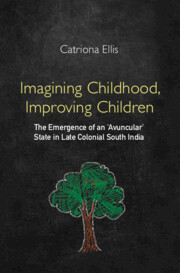 Imagining Childhood, Improving Children
Imagining Childhood, Improving Children Book contents
- Frontmatter
- Dedication
- Contents
- Acknowledgements
- List of Abbreviations
- Introduction
- 1 The Child at School: Compulsory Education in the Madras Presidency
- 2 Educating the Child: The Introduction of Compulsory Education in Madras City
- 3 Imagining the Child as Learner: Progressive Pedagogy in the Madras Presidency
- 4 Producing the Healthy Schoolchild
- 5 Saving the Child: The Madras Children Act, 1920, and the Beginnings of a Juvenile Justice System
- 6 Protecting the Poor Child: The Practical Expansion of Juvenile Justice
- 7 Defining Childhood: Sexual Parameters of Childhood
- 8 Remembering Childhoods: Childhood Memories in Autobiographies
- Conclusion: Children, Childhood and the Growth of the Avuncular State in South India
- Notes
- Bibliography
- Index
7 - Defining Childhood: Sexual Parameters of Childhood
Published online by Cambridge University Press: 19 April 2023
- Frontmatter
- Dedication
- Contents
- Acknowledgements
- List of Abbreviations
- Introduction
- 1 The Child at School: Compulsory Education in the Madras Presidency
- 2 Educating the Child: The Introduction of Compulsory Education in Madras City
- 3 Imagining the Child as Learner: Progressive Pedagogy in the Madras Presidency
- 4 Producing the Healthy Schoolchild
- 5 Saving the Child: The Madras Children Act, 1920, and the Beginnings of a Juvenile Justice System
- 6 Protecting the Poor Child: The Practical Expansion of Juvenile Justice
- 7 Defining Childhood: Sexual Parameters of Childhood
- 8 Remembering Childhoods: Childhood Memories in Autobiographies
- Conclusion: Children, Childhood and the Growth of the Avuncular State in South India
- Notes
- Bibliography
- Index
Summary
The regulation of the sexual behaviour of children and sexual maturity as a boundary of childhood became a particular focus of controversy during the 1920s. Two distinctive issues demanded political attention in the Madras Presidency: the campaign to end the devadasi system of temple prostitution and the subsequent drive to end the immoral traffic of girls and women for prostitution, and the controversies over the age of marriage and age of consent for sexual relations. Although these two disputes have a slightly different, and indeed changing, focus, they speak to the discursive construction of childhood and normative childhood behaviour, with a focus on innocence, vulnerability and sexual maturity and the development or strengthening of new ideas about what a child is, was and could be.
These controversies helped to define the parameters of childhood in discursive and biological terms and highlighted the many views existing in society about what the state's role should be in relation to the child. The chapter approaches the controversies around the age of consent and the role of devadasis through the angle of childhood and children's rights rather than seeing them only as women's issues, or eliding women and children as vulnerable. This is not to downplay the existing feminist historiography which highlights women's sexuality as a central point of disagreement between male patriarchies, whether colonial, liberal or nationalist, although Mrinilini Sinha emphasises how often nationalist and colonial approaches coalesced around a particular construction of respectable womanhood. Sinha also establishes 1928 as a moment when Indian women began to express their own concerns around ideas of citizenship, often articulated within the vocabulary of liberal universalism. This public assertion of women's rights was a response to the international outcry surrounding Katherine Mayo's book Mother India, and a number of bills to increase the age of consent in the Central Legislative Assembly in Delhi. Furthermore, Mytheli Sreenivas argues that in south India, the modernity of the Tamil nation was increasingly defined by conjugal relations, and defining the role of the wife within the family was important to the self-proclaimed modernity of the Tamil ruling classes. However, gender relations is only one aspect of this story, and this chapter shows that it was the intersection between gender and age that was so contested.
- Type
- Chapter
- Information
- Imagining Childhood, Improving ChildrenThe Emergence of an ‘Avuncular’ State in Late Colonial South India, pp. 180 - 204Publisher: Cambridge University PressPrint publication year: 2023


